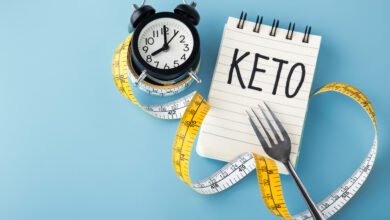My Dry January Turned Into Damp January and I Still Consider It a Win

Like many wellness editors, when the calendar hit January 1, I began my journey with Dry January. I’d spent the last year dabbling in non-alcoholic beverages, chatting with influencers in the space, and discussing sober curious trends with medical professionals, but I’d never actually committed a certain timeframe to sobriety. The time had come. I roped my parents into joining me, pushed my bar cart toward the corner of my living room, and prepared for 31 days on saying “no thanks!” to any drink offered to me.
Why I Decided to Do Dry January
The fact that I hadn’t done it before wasn’t the only reason I decided to partake in this season of Dry January. I knew what the research said—the physical benefits of abstaining from alcohol, particularly for 30+ days, were clear. Decreased inflammation, clearer skin, improved sleep, and enhanced nutrition were medically-sound benefits I looked forward to experiencing for myself.
Who Should Not Do Dry January
Dry January is not recommended for individuals who struggle with alcohol use disorder (commonly known as alcoholism) or alcohol abuse. Those individuals should practice full sobriety—not just 31 days of sobriety—to avoid relapses or medical concerns. Not only does this sobriety help the individual live a healthier life mentally and physically, but it also provides an important example of health to others who struggle with either condition.
In addition to the physical health benefits, I was curious to find out if my mental health would see noticeable improvements. I know statistically alcohol dependence and mental health is a nuanced correlation, but I wondered if I personally would experience any changes.
Lastly, I knew my social health would be impacted by the decision to give up my favorite alcoholic drinks. I didn’t view this as a necessarily negative thing, but I recognized that the hard part of Dry January would come from social settings that naturally included drinking. I rarely drink alone, so abstaining from the comfort of my own home is fairly easy. As an extroverted individual, it was my social life that would test me the most.
Dry January vs. Damp January
While Dry January is a term I was familiar with, I heard the phrase “Damp January” for the first time this year. This is for the individuals finding themselves in the gray area between sobriety and drinking culture—people who are actively choosing not to drink most of the time, but are more flexible than Dry January’s definition allows.
My January was 100% dry until a margarita in the Dallas airport turned it “damp” in the middle of the month. This was one of three drinks I ended up having over the course of January—two beers (at separate times) rounded out my tally.
Sure, I didn’t go into the month planning on having any wiggle room, but the results are still helpful for the purposes I set out to achieve. The three drinks I had were thoroughly considered before consumption (as in, I didn’t just haphazardly throw my intentions out the window), and enjoyed without any temptation to order another. And for those three instances, there were dozens of others where I actively chose to say “I’m good” when offered a glass of wine or a High Noon.
Overall, Damp January allowed me to experience sober curious behavior, which is really what I’m hoping to make my long-term lifestyle. Individuals who have other goals for their alcohol-conscious month may be more drawn to Dry January for the sake of weight management or specific physical goals, but as a social drinker looking to find more balance and awareness, Damp January ended up serving me well.
Is It Worth Doing Dry January?
I’ll be honest with you, January held a variety of unexpected stressors for me (all of which were completely unrelated to Dry January). And, as it does, stress can impact you physically, even when some of your habits are intended to provoke positive physical side effects. Some of the physical benefits I expected to happen (better sleep and clearer skin, particularly) just didn’t. And I blame that entirely on outside factors and a spike in cortisol, not my lack of booze at happy hours.
That said, I do fully believe Dry/Damp January is worth doing. Even in the middle of immense stress in a few different aspects of my life, I didn’t use stress as a cop-out to mix a drink. The three alcoholic beverages that were consumed were not had because of stress, but because of intentional decision-making and evaluation of what I wanted (not needed) to put into my body.
After concluding Damp January, I’m thrilled with my results. The month didn’t go how I anticipated, but it encouraged me to live a lifestyle that includes less alcohol. Did I miss a few glasses of wine? Sure. Do I feel like I needed them and want to dive back into drinking culture headfirst? No. If anything, a month of acknowledging and evaluating my relationship with alcohol created habits I intend to keep over the course of my life, which I consider to be a huge win.
I’d encourage anyone who’s looking for a little self-awareness to try Dry January (or Sober October) for themselves. It may not yield life-changing revelations, but it could also prompt health-forward habits that will benefit you in the long run.




